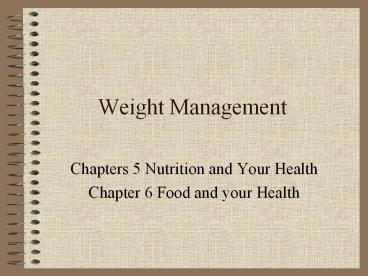Weight Management - PowerPoint PPT Presentation
1 / 18
Title:
Weight Management
Description:
Weight cycling - 'Seesawing' Avoid fasting, pills, liquid, and protein diets ... Limiting rapid weight loss. Competition eating. Vegetarianism. Nutrient Supplements ... – PowerPoint PPT presentation
Number of Views:199
Avg rating:3.0/5.0
Title: Weight Management
1
Weight Management
- Chapters 5 Nutrition and Your Health
- Chapter 6 Food and your Health
2
Key Terms
- Nutrients
- Carbohydrates
- Glucose
- Proteins
- Amino Acids (AA)
- Lipid
- Linoleic Acid
- Cholesterol
- Vitamins
- Minerals
- RDA
- Food Additives
- Enriched
- Fortified
- Overweight
- Obesity
3
Terms Continued
- Underweight
- Body Mass Index (BMI)
- Nutrient Dense
- Weight Cycling
- Anorexia Nervosa
- Bulimia Nervosa
- Electrolytes
- Rehydration
- Carbohydrate loading
- Vegans
- Nutrient Supplements
- Megadoses
4
Terms Continued
- Foodborne illness
- Contaminant
- Pasteurized
- Perishable
- Cross Contamination
- Food allergy
- Food intolerance
5
Contents
- Factors that influence what and why we eat.
- Macronutrients
- Micronutrients
- Recommended Dietary Allowances
- Health Literacy Food Consumer
- Weight Management
- Fad Dieting and Individual Needs
- Food Illness
6
Why Do We Eat What We Do?
- Hunger vs Appetite
- Environment
- Culture
- Family/Friends
- Media
- Time and Money
- Emotions
7
Macronutrients
- Carbohydrates - Provide 4cal/g, should make up
55-65 of daily calories. May be simple,
complex, or fiber. - Proteins - Provide 4cal/g, should make up 10-15
of daily calories. Made of AA. May be complete
or incomplete - Fats - Provide 9cal/g, should make up 25-30 of
daily calories. May be saturated, unsaturated,
and cholesterol.
8
Mirconurtients
- Vitamins - help regulate body processes. May be
Water soluble (B complex and C) or fat soluble
(A,D,E,K). - Minerals - Inorganic substances that the body
cannot make but act as catalysts, regulating may
vital processes
9
Vital Nutrients (Water)
- Essential to life
- body uses about 100 oz or 10 cups.
- You need 6-8 cups on the aver.
- Food is also a source
10
Recommended Dietary Allowances
- Variety of foods
- Balance eating and activity
- Eat grains, veggies, and fruits
- Low fat and cholesterol
- Moderate sugar
- Moderate salt and sodium
- Breakfast
11
Food Consumerism
- Labels contain Serving size, servings per
container, calories per serving and calories per
serving from fat, grams total fat, total carb,
fiber, sugar, protein, mg of cholesterol and
sodium per serving, DV - Ingredients list
- Additives, claims, open dating, shelf labeling
12
Weight Management
13
Balancing the Energy Equation
- 1 lb. of body fat 3500 lbs.
- Losing or gaining 1 lb. / week means subtracting
or adding 500 cal per day - Overweight means 10 over standard weight for
height. - Obesity means gt24 (males) or gt30 (females)
14
Managing Weight
- Body mass index weight x 703 / height (inches)
x itself - Target your goal, set reasonable goals, make a
plan in writing. Document progress, evaluate
periodically, recognize plateaus are normal - Eat lower calorie foods, dont skip meals.
- Increase activity level
15
Fad Diets and Eating Disorders
- Weight cycling - Seesawing
- Avoid fasting, pills, liquid, and protein diets
- Underweight - gt10 under standard weight for
height - Anorexia - irrational fear of becoming obese,
results in self induced starvation - Bulimia - Binge eating and purging
16
Individual Needs
- Training Diet
- Hydration
- Limiting rapid weight loss
- Competition eating
- Vegetarianism
- Nutrient Supplements
- Pregnancy, aging, risks with supplements
17
Foodborne Illnesses
- Contaminant infects foods
- Some foods must go through special processing
- To minimize risks
- Buying
- Storage
- Preprep/Prep
- Serving
- Handling
- Allergies
- Intolerance
18
Notes may be found at
- Http//geocities.com/nck12fgardin/index.html































